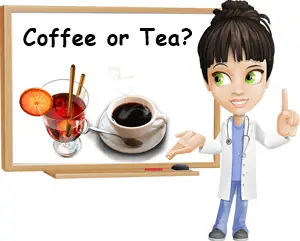Drinking either coffee or tea in the morning comes with its own set of benefits and side effects. The choice between the two brews is ultimately a matter of personal preference because neither coffee nor tea is universally good for everyone. And if we were to decide which is healthier, the answer would have to be as unique as the person asking themselves this question. Because every dietary choice impacts our health differently and choosing which is healthier, coffee or tea, means you have to decide which is in fact better for you as an individual by considering the following aspects:
1) Both are high in antioxidants. Coffee is rich in antioxidant polyphenols and further contains caffeine and theobromine, nervous and cardiovascular system stimulants with a strong antioxidant activity. Actually, coffee has about as much antioxidants as green tea and roughly as much as cocoa and regular consumption is believed to protect cells and DNA against mutagenic changes. Research shows drinking more than one cup of coffee a day can reduce risks of cancer, diabetes and degenerative nervous system diseases like dementia.

Out of all teas, green tea, black tea, white tea and oolong tea are richest in antioxidant compounds and provide as many benefits as coffee and cocoa, with green tea ranking the highest in antioxidants. Herbal teas on the other hand have a lower, although good, antioxidant value and follow coffee and teas made from the Camelia sinensis leaves closely. So if you are wondering which is better in terms of their antioxidant profile, know that coffee and white, black, green tea and usually oolong tea are all good choices.
2) Caffeine content in coffee and tea. Coffee and teas made from the Camelia sinensis leaves (meaning green, black, white and oolong tea) all contain caffeine and have a stimulating effect on the nervous system. And although the caffeine content in coffee and these teas may vary, drinking either one in the morning can help you wake up, become more alert, energized and motivated to be productive (read more about the benefits of drinking coffee in the morning).
Just be careful not to drink too much because too much caffeine can overexcite the nervous system and cause you to become agitated, anxious or experience palpitations, extrasystoles, tachycardia or other forms of arrhythmia (read more about the side effects of drinking coffee).
Herbal teas on the other hand (of the likes of nettle tea, fruit teas, ginger tea etc.) are not really good for shaking off sleep because they lack the caffeine content of coffee and green, black, white and oolong tea. Drinking herbal teas in the morning will most likely have a mildly sedative effect on the nervous system and relax you rather than make you alert.

3) Coffee or tea in pregnancy: which is better? Actually, most experts recommend pregnant women avoid tea in all forms, be it green tea, chamomile, peppermint, ginger, vervain or others. Why is tea bad for pregnancy? Because tea gets the blood flowing and can activate circulation in the uterus as well, potentially causing a miscarriage. Most medicinal plants that lend themselves to tea-making have such natural properties and pose risks for pregnant women. So as much as you may like your tea, ask your doctor if it’s safe to drink it while pregnant.
Coffee, on the other hand, is considered safe during pregnancy, in limited amounts. Still, it is best to ask your doctor if you can drink coffee while pregnant. If you are predisposed to high blood pressure during pregnancy, your doctor might recommend to avoid caffeine so it doesn’t raise your blood pressure further. Also, if you are experiencing severe acid reflux or insomnia during pregnancy, your doctor might recommend you to avoid stimulants like coffee.
4) Coffee vs tea calories. Neither coffee, nor tea actually have calories. If you drink your coffee black or tea without sugar, then you aren’t risking any weight gain. If you like to sweeten them, then it’s healthiest to choose brown sugar for your coffee, or a natural stevia sweetener, or honey (honey types) for your tea. If you are allergic to honey, pollen or bees, then go for sugar or stevia for your tea as well.
5) Coffee and tea are bad for teeth. Truthfully, both coffee and tea are bad for your teeth, but coffee is worse. Drinking coffee or tea in the morning, every day, stains teeth and can have you go to the dentist’s more often for whitening procedures. Over time, this could affect your teeth’s health. Moreover, coffee is acidic and can eat through tooth enamel causing sensitive teeth. Drinking really hot coffee or tea can also trigger tooth sensitivity, so let them cool down before you take your first sip. Drinking apple juice, lemonade or orange juice in the morning can be just as bad as coffee for your teeth because the malic and citric acid in the fruits can severely damage tooth enamel in time.
6) Coffee or tea for headaches? If you haven’t slept well and wake up with a headache, drinking either coffee or teas with caffeine (green, black or white tea) can help treat your headache. Caffeine is actually a good natural remedy for headaches, including tension headaches. Research shows it is more effective in people who don’t normally drink coffee or caffeinated beverages every day and less effective in those who drink so much coffee, green, black or white tea they have developed a tolerance for caffeine.
7) Coffee vs tea mental and physical health benefits. Not surprisingly, there are health benefits to drinking both coffee and tea in the morning, and depending on your beverage of choice, you may enjoy specific mental and physical health benefits. For example, drinking coffee in the morning regulates transit and relieves constipation, resolves headaches and even migraines, combats mental and physical fatigue, boosts energy, reduces brain fog, ups alertness, stimulates memory and learning and increases productivity. Research shows long-time coffee drinkers have lower risks of developing Alzheimer’s and certain types of cancer.
Caffeine in tea. Caffeinated teas have roughly the same benefits as coffee. Green tea in particular is healthiest because it is the least processed and has the most antioxidants of all teas, producing beneficial effects with time. Different herbal teas may have different benefits as well.
For example, hawthorn and sea buckthorn tea lower high blood pressure. Licorice helps raise low blood pressure. Dandelion and nettle are diuretic, hepatoprotective and detoxifying teas. Lemon balm and chamomile tea induce relaxation and sleep. Vervain and St John’s wort reduce anxiety. Peppermint tea is good for bloating, stomach upset and loose stools.
Coffee or tea first thing in the morning?
It’s best to avoid drinking coffee first thing in the morning, because coffee on an empty stomach is highly irritating for the gastric mucosa and can cause or worsen gastritis, ulcers and acid reflux. Green, black and white tea may have similar effects on an empty stomach because of their caffeine content. So eat and drink water first and enjoy either your coffee or your green tea after breakfast. The best time to drink coffee, and stronger teas like green tea, is not first thing in the morning, but rather after breakfast, in between 9:30 and 11:30. Read what the best hours for coffee and caffeinated tea are and why in the article Best time to drink coffee in the morning.
You can enjoy non-caffeinated herbal teas in the morning, during the day and even before bed because their lack of caffeine doesn’t alter nervous system, cardiovascular or digestive functions. Just remember to avoid plants you are allergic to or herbal teas with strong properties that may affect existing conditions. For example, if you have high blood pressure you may want to avoid drinking licorice tea every morning, or if you have low blood pressure you may want to avoid drinking sea buckthorn and hawthorn tea every morning.
Conclusion
Whether you like coffee, green tea, black tea or other herbal teas, the important thing is to consider existing medical conditions and how your preference of a morning brew may impact those conditions specifically. Just as important, avoid excesses because not even water is healthy in excessive amounts. And if you feel something is not good for you, discontinue it because what is good for others is not necessarily good for you too.
